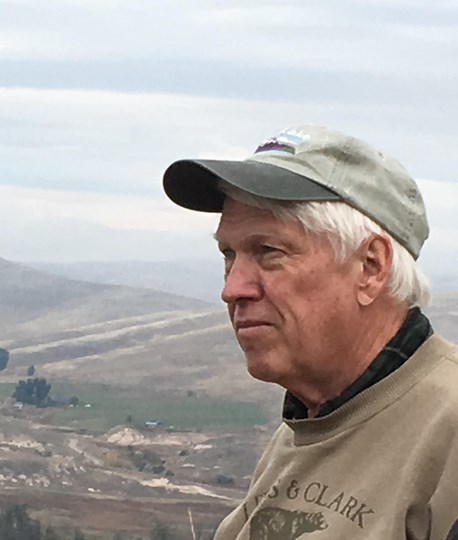W. Arthur McKee
W. Arthur McKee
University of Montana, FLBS

Art McKee
Email: art.mckee@flbs.umt.edu
Affiliate Research Professor
Art McKee retired as director of the H.J. Andrews Experimental Forest (1977-2002), an LTER site associated with Oregon State University, and is currently a research professor with the Flathead Lake Biological Station. He grew up in northeastern Vermont, and attended the Universities of Vermont, Maine, and Georgia. In addition to 30-plus years of field research in the Pacific Northwest, he has worked in the northern Rockies, the Appalachian Mountains of North Carolina, the Green and White Mountains of northern New England, the Colorado Rockies, California’s Sierra Nevada, the North Slope and Brooks Range of Alaska, and northern Minnesota. He has served as advisor to ecological research programs of the Chinese Academy of Sciences (funded by the World Bank), and for Thailand’s Chiang Mai University’s MS degree in Watershed Management (funded by the Rockefeller Foundation). Personal interests include skiing, fishing, sailing, and baseball.
Professional Experience
- Research Professor, 2002-present, Flathead Lake Biological Station, The University of Montana.
- Director, H.J. Andrews Experimental Forest, 1977-2002, Department of Forest Science, Oregon State University.
- Co-Director, Cascade Center for Ecosystem Management, 1991-2002, Oregon State University.
- Site Manager, Hubbard Brook Experimental Forest, 1986-87.
- Biologist (GS-11), Pacific Northwest Interagency Research Natural Area Program, Forestry Sciences Laboratory, Corvallis, OR, 1975-77.
- Instructor, Department of Botany & Plant Pathology, and Honors Program, College of Science, Oregon State University, 1973-76.
- Site Coordinator, H.J. Andrews Experimental Forest, U.S./International Biological Program: Coniferous Forest Biome, College of Forestry, Oregon State University, 1971-73.
- Research Associate, Biology Department, Brookhaven National Laboratory 1967-69.
- Biologist (GS-7), Cold Regions Research and Engineering Laboratory - U.S. Army, Hanover, NH, 1966
- Biological Research Assistant, Dartmouth College and Cold Regions Research and Engineering Laboratory- U.S. Army, Hanover, NH, 1965
Education
- University of Vermont, Burlington, VT. 1962-65. (Forestry, Botany)
- University of Maine, Orono, ME. 1965-67. (Forest Science, Chemistry)
- University of Georgia, Athens, GA. 1969-71. NDEA Title IV Ph.D. Fellow (Forest Ecology)
Research
McKee’s interests include terrestrial-aquatic linkages, successional dynamics of riparian and upland plant communities, and landscape- to regional-scale patterns of biological diversity. More specifically, the research has examined the processes that determine these linkages, dynamics, and patterns. Past projects have looked at: the amounts, quality, and timing of litter inputs (energy) to streams and their changes through succession; the effects of timing and severity of disturbance on vegetation succession; quantification of environmental gradients in mountain landscapes and their correlation with patterns of species distribution and abundance in riparian and upland habitats; the role of roads and streams in the movement of exotic species through a landscape; and importance of biological legacies in ecosystem recovery from disturbance.
A major goal of the research has been to improve natural resource management, and many of the studies listed above were conducted in collaboration with federal and state land-management agencies. These partnerships have greatly shortened the time between research results and application of the lessons learned.
Selected Publications
For a full listing of FLBS publications, click here.
- Brian K Hand, C.G. Flint, C.A. Frissell, C.C. Muhlfeld, S.P. Devlin, B.P. Kennedy, R.L. Crabtree, W.A. McKee, G. Luikart, and J.A. Stanford. 2018. A social–ecological perspective for riverscape management in the Columbia River Basin. Frontiers in Ecology and the Environment, Vol 16: Issue S1, pp S23–S33.
- Michener, W.K, K.L. Bildstein, A. McKee, R.R. Parmenter, W.H. Hargrove, D McClearn, and M. Stromberg. 2009. Biological field stations: Research legacies and sites for serendipity. BioScience 59: 300-310.
- Acker, S. A.; S.V.Gregory, G. Lienkaemper, W.A. McKee, F.J. Swanson, and S.D. Miller. 2003 Composition, complexity, and tree mortality in riparian forests in the central western Cascades of Oregon. Forest Ecology and Management 173: 293-308.
- Berg, D.R., W.A.McKee, and M.Maki. 2002. Restoring riparian floodplain forests. In D.Mongomery, S.Bolton, and D.Booth eds., Restoration of Puget Sound Rivers. Univ. Washington Press. Seattle, Washington.
- Franklin, J.F., D. Lindenmayer, J.A. MacMahon, A. McKee, J. Magnuson, D.A. Perry, R. Waide, and D.R. Foster. 2000. Threads of Continuity: Ecosystem Disturbances, Biological Legacies, and Ecosystem Recovery. Conservation Biology in Practice Vol. 1(1): 8-16.
- Acker, S.A., T.E. Sabin, L.M. Ganio, and W.A. McKee. 1998 Development of old-growth structure and timber volume growth trends in maturing Douglas-fir stands. Forest Ecology and Management 104: 265-280.
- Acker, S.A., W.A. McKee, M.E. Harmon, and J.F. Franklin. 1998. Long-term research on forest dynamics in the Pacific Northwest: a network of permanent plots. In F. Dallmeier and J.A. Comiskey (eds.), Forest biodiversity in North, Central and South America, and the Caribbean: Research and monitoring. pp. 93-106. UNESCO, Paris.
- McKee, A., S. Gregory, L. Ashkenas, and Chippewa Riparian Management Team. 1996. Riparian management guide, Chippewa National Forest. Chippewa National Forest, Cass Lake, Minnesota. 97 pp
- Acker, S.A., M.E. Harmon, T.A. Spies, and W.A. McKee. 1996. Spatial patterns of tree mortality in an old-growth Abies-Pseudotsuga stand. Northwest Science 70:132-138.
- Cissel, J.H., F.J. Swanson, W.A. McKee, and A.L. Burditt. 1994. Using the past to plan the future in the Pacific Northwest. J. of Forestry 92 (8): 30-31.
- Hansen, A., R. Vega, A. McKee, and A. Moldenke. 1993. Ecological processes linking forest structure and avian diversity in western Oregon. In Boyle,T. ed., Biodiversity, temperate ecosystems, and global change. Proceedings of a NATO Advanced Research Workshop, Montbello, Quebec, Canada. 17-19 August 1993. Springer-Verlag, New York.
- Swanson, F.J., A. McKee, and S.V. Gregory. 1992. Managing riparian zones as ecosystems. Watershed Management Council Newsletter 4(3): 1-5.
- Franklin, J.F., F.J. Swanson, M.E. Harmon, D.A. Perry, T.A. Spies, V.H. Dale, A. McKee, W.K. Ferrell, J.E. Means, S.V. Gregory, J.D. Lattin, T.D. Schowalter, and D. Larsen. 1992. Effects of global climate change on forests of northwestern North America. Northwest Environmental Journal 7(2): 233-254.
- Gregory, S.V., F.J. Swanson, W.A. McKee, and K.W. Cummins. 1991. An ecosystem perspective of riparian zones. BioScience 41: 540-551.
- McDade, M.H., F.J. Swanson, W.A. McKee, J.F. Franklin and J. Van Sickle. 1990. Source distances for coarse woody debris entering small streams in western Oregon and Washington. Can. J. For. Res. 20: 326-330.
Selected Grants
- RCN-SEES: Advancing our social and environmental understanding of complex mountain landscapes and their vulnerability to environmental change. $749,999. National Science Foundation, Division of Biological Infrastructure. 9/12-9/17.
- REU Site: Ecological Research in the Northern Rockies, the Crown-of-the-Continent REU Program. $220,575. National Science Foundation, Division of Biological Infrastructure. 05/04-09/07.
- Research Support for Andrews Experimental Forest. $221,508. USDA Forest Service, Pacific Northwest Research Station Award (PNW 01-CR-11261952-221). 10/01-09/06.
- Northwest Center for Sustainable Resources (NCSR): An Advanced Technology Education Focal Point. $899,283. National Science Foundation, Division of Education and Human Resources, Advanced Technological Education DUE #0101498. 10/01-10/03.
- Scalable Information Systems: from laboratories to NEONs. $50,000. National Science Foundation. 10/00-09/01
- Young-stand thinning and species diversity study. $133,771. USDA Forest Service Joint Venture Agreement, PNW-99. 09/99-09/03.
- Northwest Center for Sustainable Resources (NCSR). $4,996,950. National Science Foundation, Division of Education and Human Resources, Advanced Technological Education. 10/98-9/01.
- Communications enhancement for Andrews Forest. $225,000. National Science Foundation, LTER program. 03/98-10/02
- Inventory of riparian stand disturbance regimes. $30,000. USDA Forest Service Joint Venture Agreement, PNW-98. 05/98-12/02
- Monitoring and analysis of permanent vegetation plots. $86,227. USDA Forest Service Cooperative Agreement, PNW-98. 2/98-2/99.
- Auto-analytical equipment to analyze large numbers of water, soil, and plant samples. $42,083. National Science Foundation (Multi-user Equipment Competition). 4/98-4/99.
Professional Awards
- Cooperative Research and Management Award. 1988. Willamette National Forest, Oregon. For outstanding contributions to improving the working relationship between research and management.
- James and Mildred Oldfield Team Award. 1989. Oregon State University, College of Agriculture. "For demonstration of how individual strengths create collective success", an award for outstanding examples of collaborative research.
- Dean's Award. 1990. College of Forestry, Oregon State University, Corvallis. For exceptional contributions to furthering ecological sciences and incorporating that knowledge into forest management.
- Conservation Award. 1991. USDA Forest Service, Pacific Northwest Research Station. For outstanding contributions to ecological sciences that promote conservation of natural resources and biological diversity.
- New Perspectives Award. 1992. USDA Forest Service, Chief's Office. US Forest Service's national award for excellence in fostering improved natural resource management.
- Outstanding Contributions Award. 2001. Northwest Center for Sustainable Resources, an NSF Center for Advanced Technology Education. For outstanding contributions to education on management of sustainable resources.
Professional Memberships (dates of offices held):
- American Association for the Advancement of Science
- American Institute Biological Sciences,
- Representative from Org. of Biol Field Sta. (1990-1992)
- Association of Ecosystem Research Centers,
- Member at Large, Board of Directors (2000-2003, 2013-2017)
- Ecological Society of America
- Co-organizer of Long-Term Studies Section
- Chair, Long-Term Studies Section (2000-2002)
- Northwest Scientific Association
- Natural Areas Association
- Program committee (1990-1991, 1996-1997)
- Organization of Biological Field Stations
- Chair, Research Committee (1986-1994)
- Vice-president (1987-1989)
- Chair, NSF Relations Committee (1996-2009)
- President (1998-2000)
- Past-President (2000-2002)
- Liaison to LTER program (1996-2002)

